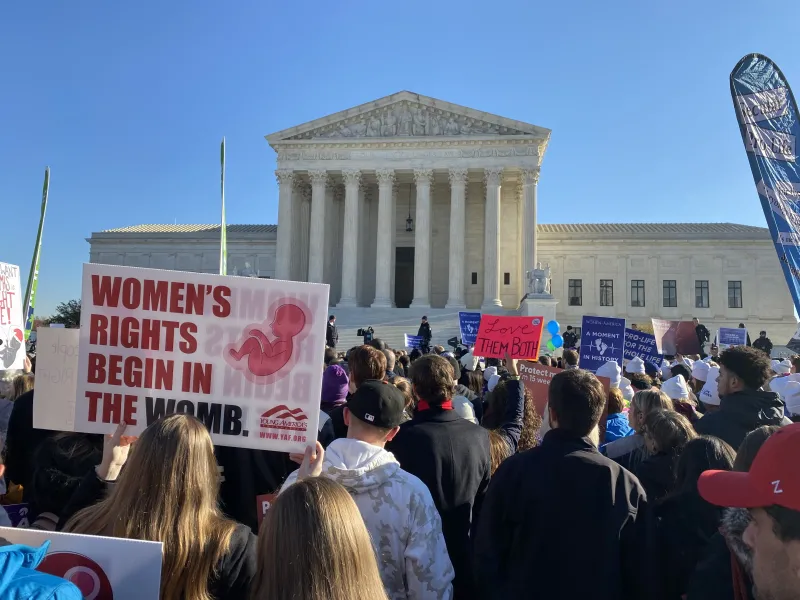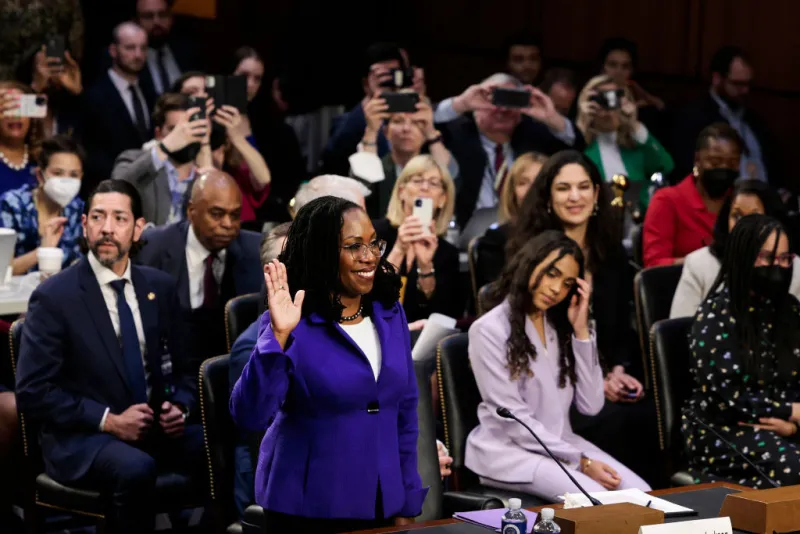
Roe v. Wade ‘egregiously wrong from the start’? Key passages from leaked Dobbs draft ruling
 Capitol police placed fencing in front of the U.S. Supreme Court on Dec. 1, 2021, during oral arguments in Dobbs v. Jackson Women’s Health Organization, in an attempt to separate rallies by abortion supports and pro-lifers. / Katie Yoder/CNA
Capitol police placed fencing in front of the U.S. Supreme Court on Dec. 1, 2021, during oral arguments in Dobbs v. Jackson Women’s Health Organization, in an attempt to separate rallies by abortion supports and pro-lifers. / Katie Yoder/CNA
Denver Newsroom, May 3, 2022 / 18:00 pm (CNA).
The Supreme Court’s previous abortion rulings were “egregiously wrong from the start” and on a “collision course with the Constitution.” These are among the colorful phrases of a 98-page preliminary draft of a U.S. Supreme Court decision that could return abortion law to the U.S. states and their voters.
The draft in Dobbs v. Jackson Women’s Health Organization was leaked on Monday evening. The Supreme Court stressed that the document “does not represent a decision by the Court or the final position of any member on the issues in the case.” But the draft shows some insight into the thought of author Justice Samuel Alito on how the court might overturn the pro-abortion decisions Roe v. Wade and Planned Parenthood v. Casey.
Here are some choice thoughts, phrases, and arguments from Alito’s draft:
Mandatory legal abortion is overruled, the debate goes back to the states.
“Abortion presents a profound moral question,” the draft concludes. “The Constitution does not prohibit the citizens of each State from regulating or prohibiting abortion. Roe and Casey arrogated that authority. We now overrule those decisions and return that authority to the people and their elected representatives.”
“We hold that Roe and Casey must be overruled,” Alito said in his introduction. “The Constitution makes no reference to abortion and no such right is explicitly protected by any constitutional provision, including the one on which the defenders of Roe and Casey now chiefly rely: the Due Process Clause of the Fourteenth Amendment.”
It’s about human life: Abortion ‘fundamentally different’ than related court decisions
“Roe’s defenders characterize the abortion right as similar to the rights recognized in past decisions involving matters such as intimate sexual relations, contraception, and marriage, but abortion is fundamentally different, as both Roe and Casey acknowledged, because it destroys what those decisions called ‘fetal life’ and what the law now before us describes as an ‘unborn human being’.” (p. 5)
“None of the other decisions cited by Roe and Casey involved the critical moral question posed by abortion.” (p. 32)
‘Egregiously wrong from the start’
“Stare decisis, the doctrine on which Casey’s controlling opinion was based, does not compel unending adherence to Roe’s abuse of judicial authority. Roe was egregiously wrong from the start. Its reasoning was exceptionally weak, and the decision has had damaging consequences. And far from bringing about a national settlement of the abortion issue, Roe and Casey have inflamed debate and deepened division.” (p. 6)
Women’s voices on abortion must be heard through the legislature and the ballot box, not the courts
“Our decision returns the issue of abortion to those legislative bodies, and it allows women on both sides of the abortion issue to seek to affect the legislative process by influencing public opinion, lobbying legislators, voting, and running for office. Women are not without electoral or political power. It is noteworthy that the percentage of women who register to vote and cast ballots is consistently higher than the percentage of men who do so.” (p. 61)
The states have ‘legitimate interests’ to regulate abortion.
“…procuring an abortion is not a fundamental constitutional right because such a right has no basis in the Constitution’s text or in our nation’s history.
“It follows that the States may regulate abortion for legitimate reasons, and when such regulations are challenged ‘under the Constitution, courts cannot ‘substitute their social and economic beliefs for the judgment of legislative bodies’.
“…These legitimate interests include respect for and preservation of prenatal life at all stages of development, the protection of maternal health and safety; the elimination of particularly gruesome or barbaric medical procedures; the preservation of the integrity of the medical profession; the mitigation of fetal pain; and the prevention of discrimination on the basis of race, sex, or disability.” (p. 65-66)
Roe v. Wade was ‘on a collision course with the Constitution’ from day one.
“…Roe’s constitutional analysis was far outside the bounds of any reasonable interpretation of the various constitutional provisions to which it vaguely pointed. Roe was on a collision course with the Constitution from the day it was decided, and Casey perpetuated its errors, and the errors do not concern some arcane corner of the law of little importance to the American people.
“Rather, wielding nothing but ‘raw judicial power,’ the Court usurped the power to address a question of profound moral and social importance that the Constitution unequivocally leaves for the people.
“Casey described itself as calling both sides of the national controversy to resolve their debate, but in doing so, Casey necessarily declared a winning side. Those on the losing side—those who sought to advance the state’s interest in fetal life—could no longer seek to persuade their elected representatives to adopt policies consistent with their views. The Court short-circuited the democratic process by closing it to the large number of Americans who dissented in any respect from Roe.” (p. 40)
Abortion precedents relied on bad history and bad reasoning
“The weaknesses in Roe’s reasoning are well-known. Without any grounding in the constitutional text, history, or precedent, it imposed on the entire country a detailed set of rules much like those that one might expect to find in a statute or regulation.” (p. 42)
“What Roe did not provide was any cogent justification for the lines it drew.” (p. 46)
“The Constitution makes no express reference to a right to obtain an abortion, and therefore those who claim that it protects such a right must show that the right is somehow implicit in the constitutional text.
“Roe, however, was remarkably loose in its treatment of the constitutional text. It held that the abortion right, which is not mentioned in the Constitution, is part of a right to privacy, which is also not mentioned.” (p. 9)
“Roe either ignored or misstated this history, and Casey declined to reconsider Roe faulty historical analysis. It is therefore important to set the record straight.” (p. 16)
“Until the latter part of the 20th century, there was no support in American law for a constitutional right to obtain an abortion. Zero. None. No state constitutional provision had recognized such a right. Until a few years before Roe was handed down, no federal or state court had recognized such a right…
“Not only was there no support for such a constitutional right until shortly before Roe, but abortion had long been a crime in every single State. At common law, abortion was criminal in at least some stages of pregnancy and was regarded as unlawful and could have very serious consequences at all stages. American law followed the common law until a wave of statutory restrictions in the 1800s expanded criminal liability for abortions.” (p. 15)
“By the end of the 1950s, according to the Roe Court’s own count, statutes in all but four states and the District of Columbia prohibited abortion ‘however and whenever performed, unless done to save or preserve the life of the mother’.
“This overwhelming consensus endured until the day Roe was decided. At that time, also by the Roe Court’s own count, a substantial majority—30 States—still prohibited abortion at all stages except to save the life of the mother…
“The inescapable conclusion is that a right to abortion is not deeply rooted in the Nation’s history and traditions. On the contrary, an unbroken tradition of prohibiting abortion on pain of criminal punishment persisted from the earliest days of the common law until 1973.” (p. 24)
The Supreme Court can’t settle the abortion debate
“This Court’s inability to end debate on the issue should not have been surprising. This Court cannot bring about the permanent resolution of a rancorous national controversy simply by dictating a settlement and telling the people to move on. Whatever influence the Court may have on public attitudes must stem from the strength of our opinions, not an attempt to exercise ‘raw judicial power’.” (p. 64)



